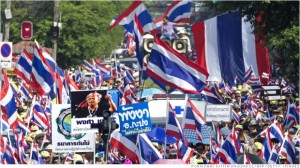By Britt Wouters
UCR Class of 2015
On February 1st protests in Bangkok got violent. For the past three months, many Thai citizens who were dissatisfied with the current government have been protesting at several locations throughout the country. Protest leader Suthep Thaugsuban has declared that the demonstrations are a  means of non-violent protest for those in favour of reform before elections. However, the promise of peaceful protest has not been upheld, as several civilians have been injured in a gunfight between the pro-government movement and the protesters.
means of non-violent protest for those in favour of reform before elections. However, the promise of peaceful protest has not been upheld, as several civilians have been injured in a gunfight between the pro-government movement and the protesters.
The protests were triggered three months ago, following the governing party’s Pheu Thai, request to grant amnesty to its former leader Mr. Thaksin. Mr. Thaksin wants to return from exile and be cleared of his corruption charges, which are according to him politically motivated. However, the protesters want to counter his dominance of the governing party and have the former leader prosecuted for his actions. Even before the protests, the citizens of Thailand were suspicious that the Prime Minister, Yingluck, the sister of Mr. Thaksin, was being corrupted and influenced by him from afar.
The protesters suggested solution for overcoming Mr. Thaksin’s control was to replace the government with a “people’s council”. The protesters represent a minority of the populace and would have slim chances of translating their protest into political action, as a result. The “people’s council” would suspend democracy, for as long as is necessary to bring about change and reform.
Thailand’s current governing party, Pheu Thai, has already stated they cannot agree to the protestor’s proposed solution to dissolve the current democracy. In exchange they have offered to hold re-elections. It was during this new election that the shooting occurred, as ballots were being distributed throughout Bangkok. The anti-government party attempted to block the government. This raised many complaints and anger amongst the pro-government voters, as they felt democracy was being held up with the attempted blockades. The United States, as well as the European Union, have expressed their support for upholding the democratic process.
However, members of the protest-movement have stated that the upcoming elections are not democratic either. The protest movement reported instances of candidates not being able to register, resulting in their inability to compete in this election. Many polling stations did not have any votes cast in them, either as a result of the blockade or due to the lack of ballots at certain polls. The leader of the Democrat Party, Abhisit Vejjajiva, who is on the side of the demonstrators, stated that the elections were “unconstitutional” and did not “achieve the aim of an election under a democratic system”.
Opponents of Mr. Abhisit have stated that he is incompetent to rule. He was charged with murder in 2010 when in his capacity as a prime minister he was supposedly responsible for a crackdown on pro-Thaksin demonstrators. Furthermore, opponents have also stated that Mr. Abhisit motives for boycotting the elections are not self-less: extra-constitutional means would increase the likelihood of him rising to power. He does not have a majority supporting him, although the military and elites have been his constant supporters.
Somchai Srisuthiyakorn, the election commissioner has stated that “anything can happen”. Now that the elections have been concluded, the protestors are left with little to do. Most have pledged to continue protesting the government and the Prime Minister, Yingluck, by challenging the legitimacy of the election as well as any future controversial decisions made by the government. Despite the protests winding down, the potential for unrest is still ever present so long as the political situation in Thailand remains unchanged.
Britt Wouters, Class of 2015, is a Law & Politics Major, from Bladel, Noord-Brabant, The Netherlands.
